How To Identify And Deal With Basement Bugs
Published Date: March 28, 2022
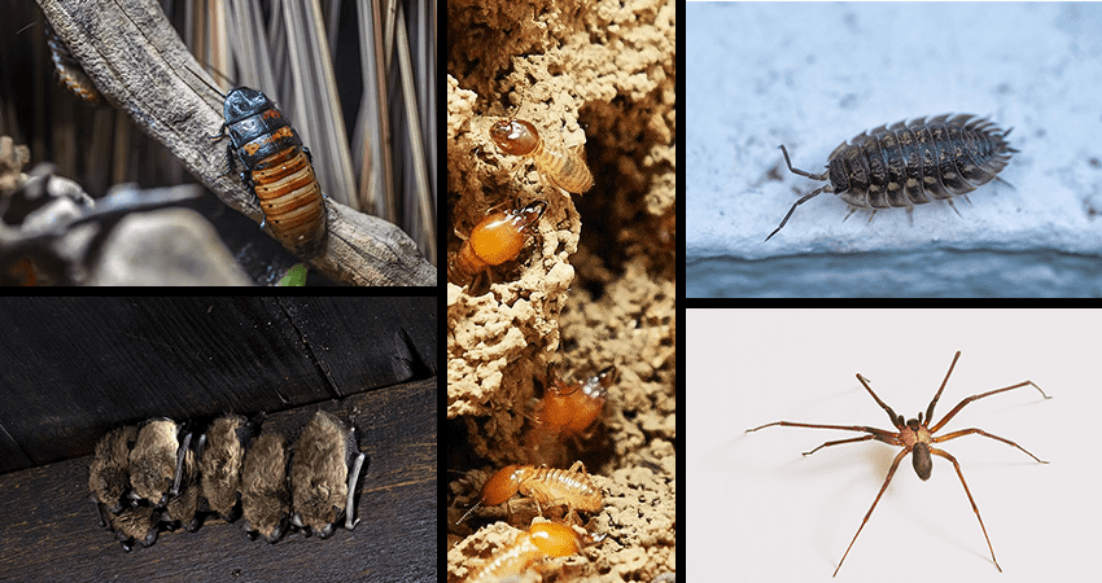
The basement is where the worst things happen in horror movies, and with good reason. As a dark, possibly damp, and warm location, the basement is the original home of humanity’s greatest fear- the giant creepy crawlies!
If you’re hearing clicking and shuffling noises, you probably have a bug infestation, and there are many basement bugs capable of silently growing their population to alarming numbers.
But we’ve got your back with this guide for identifying and dealing with basement bugs!
Some basement-loving insects are just a nuisance, but others can be harmful. They can inflict bites and stings, cause diseases and even destabilize your home structurally. A pest infestation may also worsen allergies and breathing problems among susceptible people.
Keep reading to find out all about dealing with scary basement bugs. You can identify which vermin is haunting you, the best way to get rid of it, and ways to make your basement less attractive to insects.
What Are Some Common Basement Bugs?
Basement bugs tend to vary across states, climates, and geography. But, most homes tend to see these leggy intruders.
Cockroaches
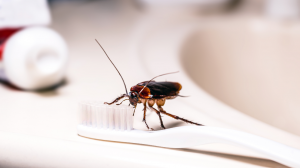
The original creepy crawler that sends a shudder through pretty much everyone, these insects are easily identifiable with their 1-1.25 inch long, dark brown, flattened bodies. They have distinct antennae.
While cockroaches don’t bite, they are very unsanitary and spread diseases due to their propensity for rotting garbage and then trying to get to your food. They also reproduce quickly, establishing a stubborn colony if not dealt with right away. Oriental cockroaches are the most common type.
Spiders
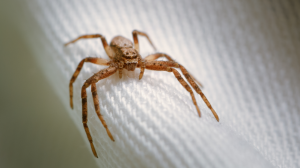
Spiders are the stuff of nightmares, the favorite monster of many a horror movie. However, they aren’t all harmful; some can even be kept as pets. But the house spiders and long-bodied cellar spiders are not among these domesticated species.
Spiders aren’t harmful and are not known to sting. They just end up making a mess with their webs. On the other hand, black widow spiders and brown recluse spiders can cause pain with their venom. With their eight legs, spiders are easy enough to identify.
Rodents

Not insects for sure, but they do count as pests. Rats and mice have long been associated with the spread of dangerous diseases like the plague and Hantavirus. They also make nests behind walls and crawl spaces, weakening your home structurally by gnawing through good wiring and pipes. The worst that can happen is them stinking up your home if they die in the holes they inhabit.
Woodlouse
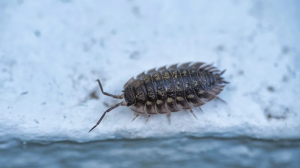
This bug, also called sowbug, is another common basement find. It has a distinctive appearance with a flat oval body, thick segmented exoskeleton, seven tiny legs, and antennae. They aren’t harmful at all, but an infestation of woodlice can get stinky very quickly because of the ammoniacal smell around them. They also gnaw on objects and books. They reproduce quickly and pose a threat to your garden, and can kill many plants.
Camel Cricket
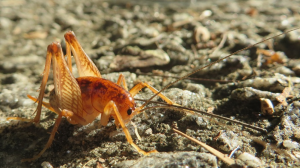
The name comes from their humped bodies and the six angled legs. Camel crickets are not harmful, but they can be terrifying when they jump high into the air, though that means they are more scared of you. They have mottled bodies up to 1.5 inches in size. Unlike regular crickets, camel crickets don’t chirp.
Termites
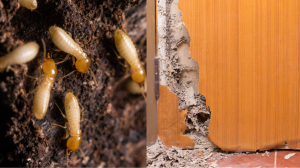
Termites are some of the most problematic basement bugs. These bugs can cause structural damage to your home by eating up the wood. The damage, if left unchecked, can be costly to fix. They make the home susceptible to water damage.
Termites can also ruin wooden furniture. They look similar to ants, especially when there is a swarm in the spring, but their wings are equal in size, while their bodies are more uniformly thick with straight antennae.
Earwigs
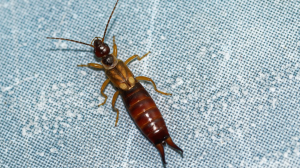
Despite the name, they don’t crawl into people’s ears. Earwigs may bite, but they aren’t poisonous. They are, however, a nuisance and can destroy garden plants. They are dark brown insects, up to an inch long, narrow bodies with six legs and a pair of distinctive pincers protruding from the posterior part of the torso. They have two pairs of wings, but not all varieties can fly.
Silverfish
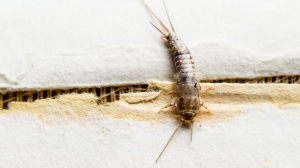
Silverfishes are a recognizable menace if you have an extensive library, but these pests aren’t harmful. However, they have a propensity for destroying clothes and books. They are small, elongated insects with flattened bodies that can run very fast. The color may be grey or brownish with three tail-like appendages from the back and long antennae in front.
Centipedes and Millipedes
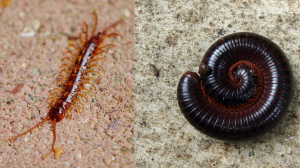
Centipedes are long and worm-like with one pair of legs per body segment and totally 15-177 leg pairs. House centipedes are not too dangerous- they only come out at night and don’t sting. They eat other insects. The bodies are brownish, yellowish, or grayish. Other varieties may be poisonous.
A millipede has two pairs of short legs on each body segment. The number of legs can vary from 40 to 400. A millipede under threat can emit a stinky liquid as a defense mechanism and cause allergies. It is not really poisonous.
Comparatively Rare Basement Bugs
Springtails
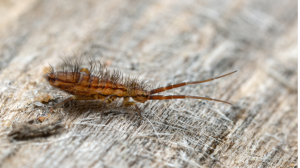
These tiny, hairy insects are identifiable as springtails when they swarm into balls resembling fuzzy swatches of fabric. They are more common in gardens where they can chew up plant roots but aren’t otherwise harmful.
Bedbugs
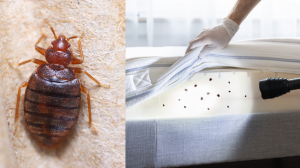
As suckers for human blood, bed bugs are more likely to be present in bedrooms than in basements, but if you have mattresses laying around in the corners, they could hide there permanently. Small, flattened, brown, round bodies, these insects have a distinct scent when squashed, and they may also leave bloodstains.
Bats
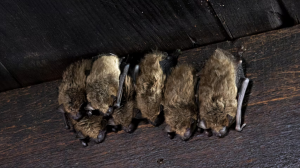
Not a common pest, but some bats could make colonies in older basements and cold, damp ones with cellars. The biggest problem with them is the nasty smell they leave.
Why Are There So Many Bugs In The Basement?
Basements tend to attract many bugs and even bigger pests like rodents. Insects like the damp, dark places and basements can get very moist when not ventilated well. In the case of termites, the basement is also closest to soil and hence an ideal location.
Another thing they like is a steady food supply. If the basement is close to a garden, that makes for an ideal combination to foster basement bugs. A spider infestation is a clear sign of basement bugs because they consume other insects.
If you store many things in your basement, it can get messy and disorganized and provide hiding places for the bugs. When so many favorable conditions exist, pests will find their way in, through crevices and cracks.
How To Get Rid Of Basement Bugs?
Some bugs are beneficial and keep other bugs at a minimum, while many cause infestations that are difficult to control. Here are some ways to get rid of the annoying indoor bugs:
Cockroaches
Cockroaches can be challenging to be rid of since they develop resistance to store-bought pesticides very quickly. Older homes are especially prone to developing cockroach infestations.
They leave their eggs in hidden places, so even if you get rid of the adults, they repopulate within no time. Pest control professionals are the best way to handle an advanced cockroach infestation.
However, prevention can go a long way. You should seal any cracks in the walls and flooring and place screens on overflow drains and sewer openings. To reduce dampness in the basement, fix leaky pipes, and improve the ventilation.
Move garbage cans away from the house since cockroaches tend to live in them and remove garden waste promptly. Sprinkle diatomaceous earth in areas where they roam since the particles cut up the exoskeleton.
Spiders
Spiders follow other basement bugs, so getting rid of every other infestation should also take care of them. Regularly getting rid of the cobwebs is only a topical measure.
Spiders do not like the scents of citrus, peppermint, or eucalyptus, so use these essential oils as sprays around the basement. Also, keep the area clutter-free. Rather than using cardboard boxes, use sealable metal or plastic boxes that won’t allow the bugs in.
You can get spider traps to catch and dispose of spiders humanely. However, if there are too many spiders, this won’t be helpful. You may have to call in the exterminators.
Rodents And Bats
If you have a rat or mouse infestation, the first thing to do is conduct a thorough inspection of the home. It is essential to identify exactly where the rodents are nesting because they may die and stink up your home if you seal openings without first clearing out their nests.
Take a look at the garage, any spaces in the foundation, cracks through the floor, boxes, furniture stored for a long time, and any other openings. If you suspect that rodents have nested behind your walls, you should call a pest control company to take care of it without ruining the house.
You can try natural deterrents like pepper or cloves in the spaces between the basement, walls, and other house parts. Place rat traps wherever you suspect that they move frequently.
Woodlouse
Woodlice or sowbugs stay away from warm and dry basements, so make sure to minimize any dampness and moisture. You can also clear them up by vacuuming the basement regularly. Keep any cracks sealed and windows closed. You can also sprinkle ant and insect powders as they are also effective against woodlice.
Camel Cricket
Having camel crickets in the basement is an indication that the region is too moist. Dry out the basement a bit, and the number of camel crickets should reduce. If you are comfortable with insecticides at home, they can help get rid of camel crickets.
Termites
The basement is a favored location of subterranean termites. They can cause a lot of damage, and an infestation is hard to control once it is underway. The best approach is to try to prevent a termite infestation.
Humid environments attract termites, and therefore it is essential to waterproof the basement to block any entry points and reduce the amount of moisture. Pre-treated foundations are more resistant to termites.
If you find a heavy termite infestation, it is better to call a pest control company to stem the spread. It is of particular risk if the termite infestation has extended into the drywall and they have built extensive mud tubes.
If you see just a few termites, you should make sure to discard whatever wood they are feeding on and spray boric acid or some anti-termite treatment around the basement.
Earwigs
If windows and cracks are opening up to the basement, particularly with leaf mounds building up against it, you may find earwigs frequently. When unfavorable weather conditions like rain, snow, or drought strike, these insects seek shelter in the basement.
Build a stone or rock barrier between your home’s foundation and the garden. Earwigs are also attracted to light, so if you have bright lights in the basement, you may consider getting insect repellent ones.
Earwigs also enjoy high humidity. You may consider getting a dehumidifier for your basement, as it will reduce the chances of many other pest infestations as well.
Silverfish
These bugs thrive in the same conditions mentioned above and, therefore, making sure the basement is not damp, free of clutter, with gaps and cracks filled in, helps control their occurrence. Make sure that all the food is stored away in airtight containers.
Springtails, Centipedes, and Millipedes
These bugs occur wherever there is moisture and a lot of organic debris. Therefore, try to keep the basement dry and cool while ensuring that critters from the garden can’t get into your home. For ordinary house centipedes, small populations can be controlled using sticky traps.
Bedbugs
If you have a bedbug infestation, the best thing to do is discard all mattresses and bed linen. Never pick up curbside furniture as bedbugs hitch a ride on such things. You can eliminate a few bedbugs with insecticides, but if you’re seeing them in the basement, the chances are that it’s time to call in the experts.
How To Bug-Proof Your Home And Basement?
Some simple ways to keep bugs out are:
- Declutter regularly. If you use the basement to store things, open the items regularly, move them around and clean up the area. You may want to donate old clothes and books to avoid attracting silverfish.
- Sprinkle Diatomaceous Earth everywhere since they repel most insects.
- If you have heaters or washing machines in the basement, make sure they never leak.
- Add door and window screens to keep tiny pests out. Keep them shut otherwise.
If you find that first-line chemicals and home remedies aren’t working, it’s time to ask a professional pest control company to help. Some regional pest control companies specialize in area-specific bug fighting services, while others have a nationwide presence. If you are interested in organic gardening and would like to balance beneficial insects, you should also rope in an entomologist.
Here are our recommendations:
Terminix
Offers free routine inspections
Offers - $50 off for first-time customers and military folks
Terminix is one of the largest pest control companies in the US, offering to eliminate even wildlife pests like rodents and raccoons. Considering how pests like to hide in crawl spaces, Terminix’s services for this area specifically will come in handy for basement bug control. They offer a Nix Pest Guarantee against the return of the bugs.
Orkin
Specializes in integrated pest management
Orkin is a leading pest control company with over 120 years of experience. Their expertise in termite control has brought many accolades over 70 years. After the treatment, they leave customers with a detailed plan for follow-up and maintenance to prevent recurrences. They also look at the home’s exterior to help identify the likely sources of infestation.
Bell Environmental Services
Offers harmless eco-friendly treatments
Offers - 10% off pest control products’ subscription
Bell Environmental Services is a green company known for use of trademarked sniffer dogs to detect bed bug infestations. They follow an IPM approach and use physical pest treatments like freezing, steam, etc. to deal with pesky critters. The Bell Services technicians do regular follow-ups and the company offers a zero-pest guarantee.
Truly Nolen
Has trained entomologists on board to design treatments
Discount - $50 off on year-round pest control
Truly Nolen is a pest control company that has been around since 1938. They are known for the environmentally-responsible services that they design, with botanical aerosols and borate powder-based treatments. They have expertise in the treatment of more than 100 pests. If you’re not satisfied with their work, they offer a 100% refund.
Massey Services
Offers sustainable pest control services
Discount - Limited time offer of up to 20% off on 3+ annual services
Though Massey Services operates only in Florida, Georgia, Louisiana, Texas, South Carolina, North Carolina & Oklahoma, they have a strong network of service providers and vehicles. Massey Services offers targeted treatments that resolve pest issues while balancing environmental needs like lawn treatments that optimize water-use efficiency. They also aim to stop pests from breeding with perimeter targeting.
Bottomline
Basement pest control can be challenging. If you have a recreation room or cellar, you’d hate to see pests ruining the peace and the items kept in there. If you’ve bought an older home, it can be challenging to prevent the entry of these bugs because there would be cracks and openings due to years of weather-controlled expansion and contraction.
There is nothing to worry about if you see an occasional basement bug because insects always hop inside. The measures suggested above can help.
An infestation, on the other hand, can get problematic very fast. It’s better to call in pest control professionals rather than DIY bug bombs or carry out treatments that may not be safe for you to handle. The professionals can give you customized prevention plans.
Frequently Asked Questions (FAQs)
What Kind Of Bugs Live In Basements? Is It Normal For Basements To Have Bugs?
Many bugs like termites, spiders, earwigs, sowbugs, rats, and mice, among others, like to inhabit basements. It is very typical for basements to inhabit bugs because they prefer damp, cool places.
Do Basement Bugs Bite?
Some basement bugs may bite, most of the above don’t. If your home is where scorpions, black widow spiders, or poisonous centipedes occur, you should take strong measures to get rid of the bugs.
How To Prevent Bugs In The Basement?
Eliminating the dampness in the basement can go a long way in preventing basement bugs. Keeping the area well-ventilated, reducing clutter, and ensuring that insects can’t get to any food source can help immensely.
Do Apartment Basements Have More Bugs?
The number of bugs in a basement has more to do with clutter, the basement architecture, and access to moisture. An apartment with a lot of piping running by the basement and junk cluttering it up would be prone to seeing more basement bugs.
What If I Still Can't Identify The Bug I Found In My House?
A pest control company will help identify bugs that you can’t figure out. If you see infestations that aren’t responding to the usual measures, it’s better to call in the professionals.
What Are The Bugs In My Basement With Lots Of Legs?
Centipedes, millipedes, and spiders are among the bugs with the most legs.
What Are The Little Bugs Flying Around In My Basement?
Fruit flies, flying ants, and springtails can fly around the basement. You should observe the bug safely and match the features with the list here.
What Are Those Long Black Bugs In My Basement?
Long black bugs in the basement are likely to be earwigs or centipedes. Take a look at the legs to identify more accurately.
What Can Be A Reason For Bugs/Insects To Die Inside A House/Apartment?
Bugs may die inside the house for three main reasons:
- Their natural life cycle coming to an end
- A predator feeding on them
- Loss of access to their food source and the development of other inhospitable conditions
What Type Of Bugs Can Enter A House Through The Drain Pipes?
Ideally, bugs shouldn’t be able to enter through drain pipes, but sometimes cockroaches, centipedes, and rodents can travel in these pipes and hitch a ride home.
Can I Seal My Basement From The Inside?
You can seal your basement against moisture and dampness by waterproofing it. You’ll have to fill cracks and gaps along and ensure that the water drains away from the basement by positively grading it. More advanced sealing may require professional assistance.
Does A Dehumidifier Help Get Rid Of Bugs?
A dehumidifier alone is not adequate to get rid of bugs, but it certainly can help to reduce moisture levels and make the basement unattractive to the bugs.
Can I Bug Bomb My Basement?
Bug bombs are foggers sprayed in an area, in this case, the basement, where many bugs occur. They are helpful for basements, but you will have to steer clear of the area until the fog disappears. Be warned, though, that the bug bomb may not reach crevices and cracks where insects can hide.
Why Are There Flies In My Basement?
Flies are attracted to food sources. If you see them in your basement, check if any stored food is safe from breaches and if any dead pests are decomposing.
Is It Even Possible To Have A Bug-Free Home?
Bugs tend to come repeatedly, but using professional pest control services can prolong the bug-free periods in your home. You should also keep your home clean and make it inhospitable to bugs.
How Do I Get Rid Of Spiders In My Basement?
Firstly, seal all the entry points like cracks and crevices. Reduce clutter as much as possible and follow all the measures to eliminate other bugs because spiders feed on them. You can use bug sprays or essential oils if you don’t use too many chemicals. If nothing else works, it is better to call in a pest control company.
